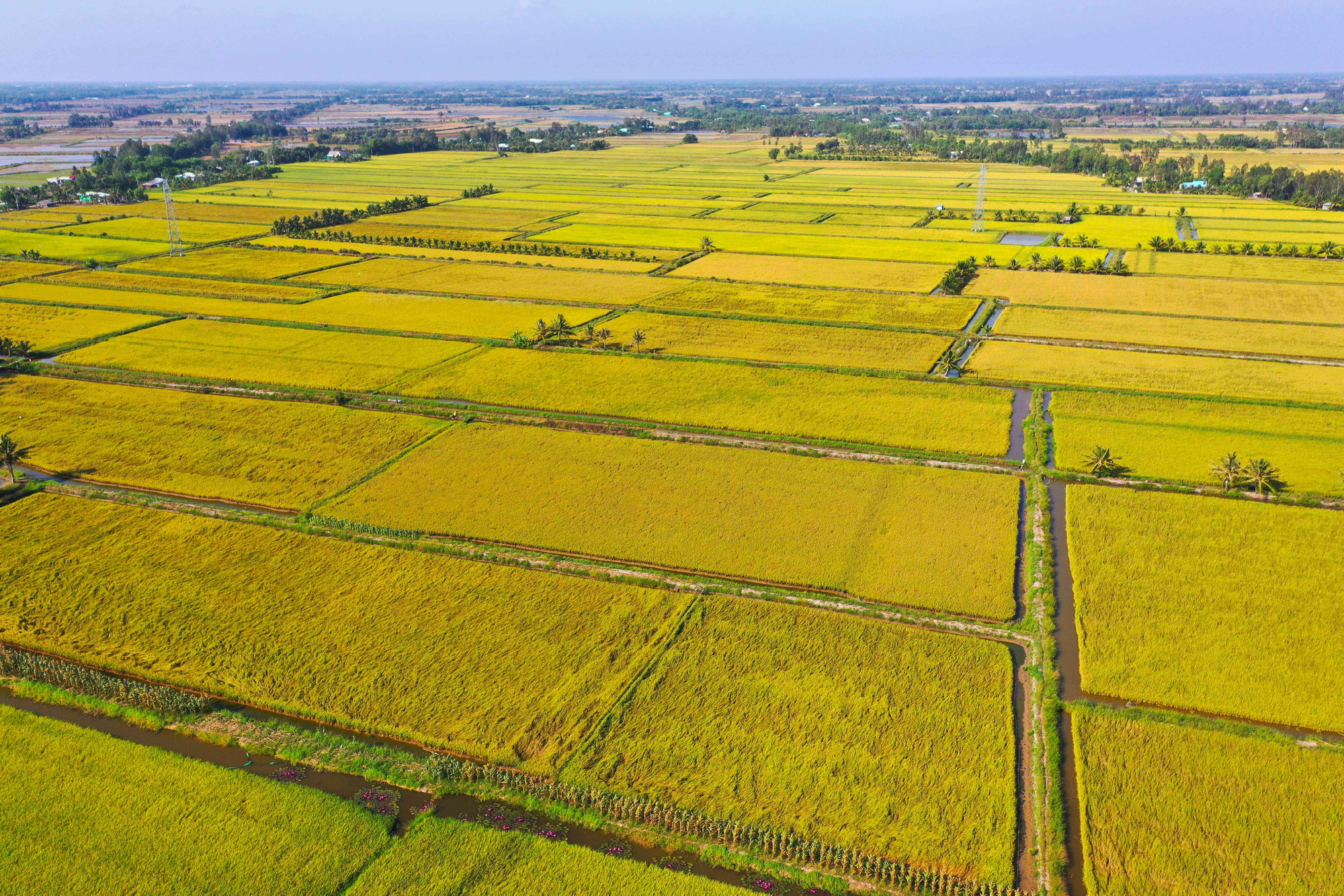As Vietnam tackles the challenges of developing a carbon market, it remains cognizant of the finite nature of carbon credits, emphasizing the need for sustainable strategies in emission reduction and green transformation.
The country’s future carbon market was recently discussed by a group of experts at the ‘Carbon Credit Market - A Driver for Building a Green Vietnam’ conference hosted by Tuoi Tre (Youth) newspaper in Ho Chi Minh City on April 20.
A finite environmental asset
Dr. Pham Van Dai, a senior lecturer at the Fulbright School of Public Policy and Management, highlighted the challenge of assessing the value of carbon credits, stressing that their current market price of US$5 is subject to price fluctuations.
Dai specifically emphasized the importance of recognizing carbon credits as a finite national resource rather than an unlimited or renewable asset.
He also noted carbon credits face their own host of issues.
 |
| Dr. Pham Van Dai, a senior lecturer at the Fulbright School of Public Policy and Management, speaks at the ‘Carbon Credit Market - A Driver for Building a Green Vietnam’ conference held in Ho Chi Minh City, April 20, 2024. Photo: Quang Dinh / Tuoi Tre |
Specifically, Dai cited Australia, where, despite rigorous inventory tracking, approximately three-quarters of carbon credits face quality issues and many forests sold for carbon credits being destroyed post-sale.
Currently, carbon credit prices can reach $200-300 per credit when quality is verified, taking into account project nature and implementation costs.
With global industry leaders like Apple and Samsung mandating carbon neutrality amongst their suppliers, the carbon credit market in Vietnam is set to balloon.
“In light of present circumstances, I believe Vietnam should regard carbon credits as a valuable resource requiring protection,” said Dai.
“Additionally, we should explore establishing a Carbon Credit Reserve Fund for Vietnamese businesses in order to mitigate the high costs of global certifications.”
 |
| Nguyen Van Minh, head of economics and climate change information at the Department of Climate Change under the Ministry of Natural Resources and Environment, speaks at the ‘Carbon Credit Market - A Driver for Building a Green Vietnam’ conference held in Ho Chi Minh City, April 20, 2024. Photo: Quang Dinh / Tuoi Tre |
When asked why Vietnam does not stockpile carbon credits for future use or as an investment product, Nguyen Van Minh, head of economics and climate change information at the Department of Climate Change, responded by emphasizing the country’s commitment to achieving net-zero emissions.
Minh also noted that carbon credits set to expire in 2030 may not be usable after that time, making them a poor investment.
Additionally, carbon credit prices can be extremely volatile.
Between 2008 and 2012, carbon credit prices soared to $30 per credit globally.
However, from 2013 to 2020, a gap period emerged as nations around the world refrained from participating in emission reduction commitments, citing concerns over fairness.
Consequently, carbon credit prices plummeted to just a few U.S. dollars.
According to Minh, there are cases of Vietnamese businesses earing carbon credits from 2008 to 2013 but being unable to sell those credits due to a decline in prices.
Now, a decade later, the credits remain in the depository system.
 |
| Nguyen Ngoc Huy, an independent climate change researcher, speaks at the ‘Carbon Credit Market - A Driver for Building a Green Vietnam’ conference held in Ho Chi Minh City, April 20, 2024. Photo: Quang Dinh / Tuoi Tre |
Nguyen Ngoc Huy, an independent climate change researcher, asked the conference why airlines and oil companies have rushed to purchase carbon credits while Vietnamese businesses lag behind.
Huy also questioned why domestic firms are not adopting emission reduction technologies and practices at the same rates as their foreign counterparts.
Dai answered by noting that many local businesses seek sustainability measures outside of carbon credit procurement, including embracing Environmental, Social, and Governance (ESG) practices.
Comparatively, accessing carbon credits is a much large-scale endeavor which requires substantial funding.
A major chunk of this funding is put toward the Measurement, Reporting and Verification (MRV) guidelines, which involve not only measuring each hectare of forest but also monitoring extensive forested areas spanning several hundred hectares.
“This constitutes a significant challenge, heavily reliant on a higher number of buyers than sellers,” said Dai.
“To truly establish itself as a market, [the carbon credit market] requires precise regulations in an environment fraught with numerous risks.”
 |
| Nguyen Vo Truong An, deputy general director of ASEAN Carbon Credit Exchange JSC (CCTPA), speaks at the ‘Carbon Credit Market - A Driver for Building a Green Vietnam’ conference held in Ho Chi Minh City, April 20, 2024. Photo: Quang Dinh / Tuoi Tre |
According to Nguyen Vo Truong An, deputy general director of ASEAN Carbon Credit Exchange JSC (CCTPA), carbon credits serve as a financial resource supporting emission reduction and climate change mitigation efforts.
In the pursuit of net zero, An emphasizes that relying solely on afforestation or sustainable agriculture is insufficient; rather, leveraging information technology and implementing emission reduction strategies are imperative.
Pham Van Viet, vice president of the Ho Chi Minh City Association of Garment, Textiles, Embroidery and Knitting, stressed the textile industry’s shift toward sustainability, including energy conversion and material recycling.
Viet highlighted the importance of authorities providing clear guidance to Vietnamese businesses on emission inventory processes, particularly in response to scrutiny from European customers.
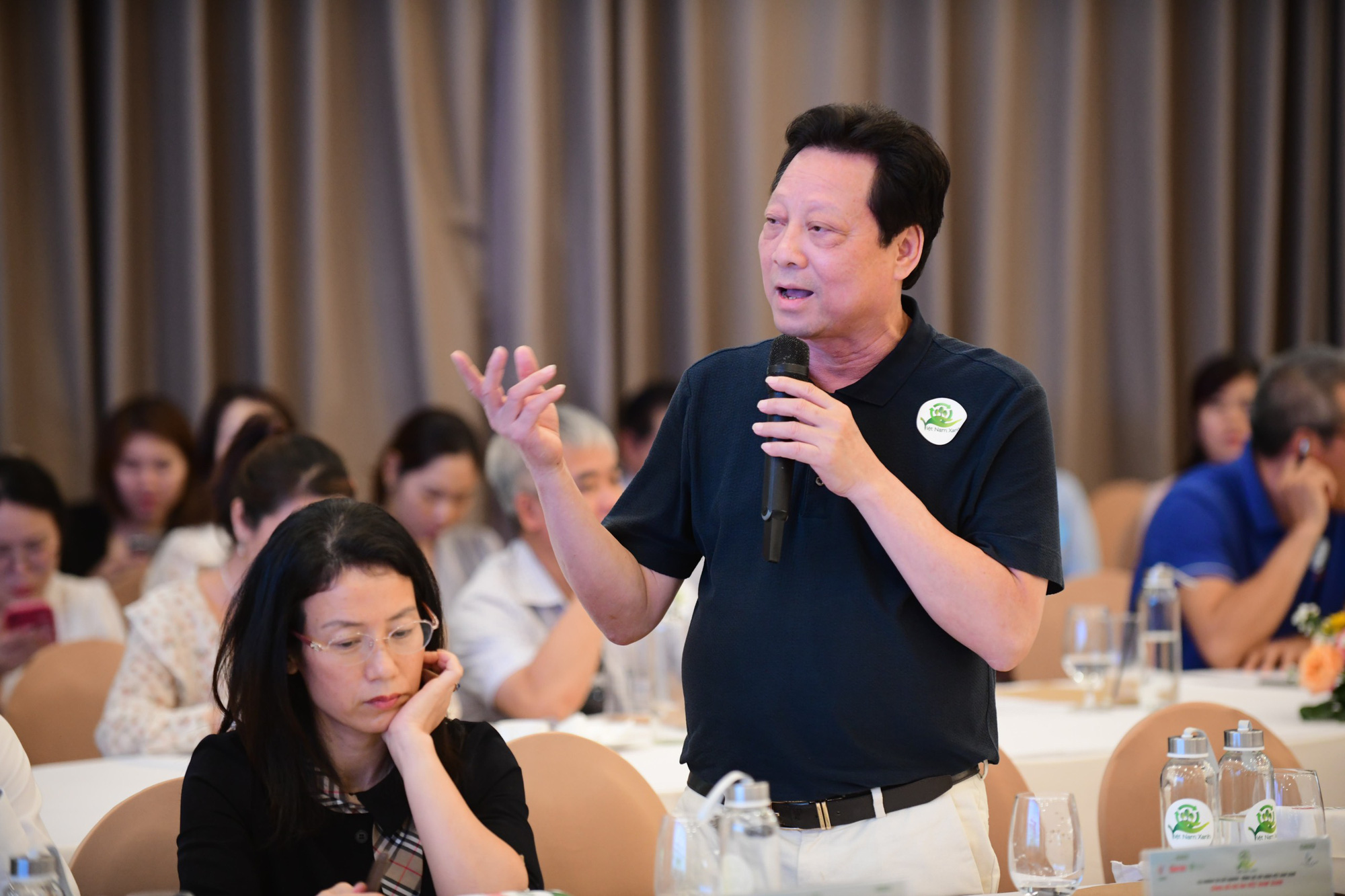 |
| Pham Van Viet, vice president of the Ho Chi Minh City Association of Garment, Textiles, Embroidery and Knitting, speaks at the ‘Carbon Credit Market - A Driver for Building a Green Vietnam’ conference held in Ho Chi Minh City, April 20, 2024. Photo: Quang Dinh / Tuoi Tre |
Barriers to green transformation
Assoc. Prof. Dr. Nguyen Dinh Tho, director of the Institute of Strategy and Policy on Natural Resources and Environment, used the conference to underscore that green transformation is evolving from a trend into legislated mandatory regulation.
However, Vietnam still faces numerous barriers, including a lack of coordination and unity among various governmental sectors and levels, resulting in overlapping and inconsistent policies and impeding the effective implementation and monitoring of green growth actions and goals.
Moreover, the nascent green finance system poses challenges for mobilizing financial resources for green projects, while lax enforcement of environmental regulations leads to non-compliance by businesses.
Tho advocated for enhancing inter-agency coordination to ensure consistency and synergy in green growth policies, alongside increasing public and private investment in green infrastructure projects like solar power plants, waste management systems, and urban greening initiatives.
He also stressed the need to establish a coherent legal framework for green growth and to raise public awareness of environmental issues and sustainable practices through advocacy and community participation in climate change adaptation efforts.
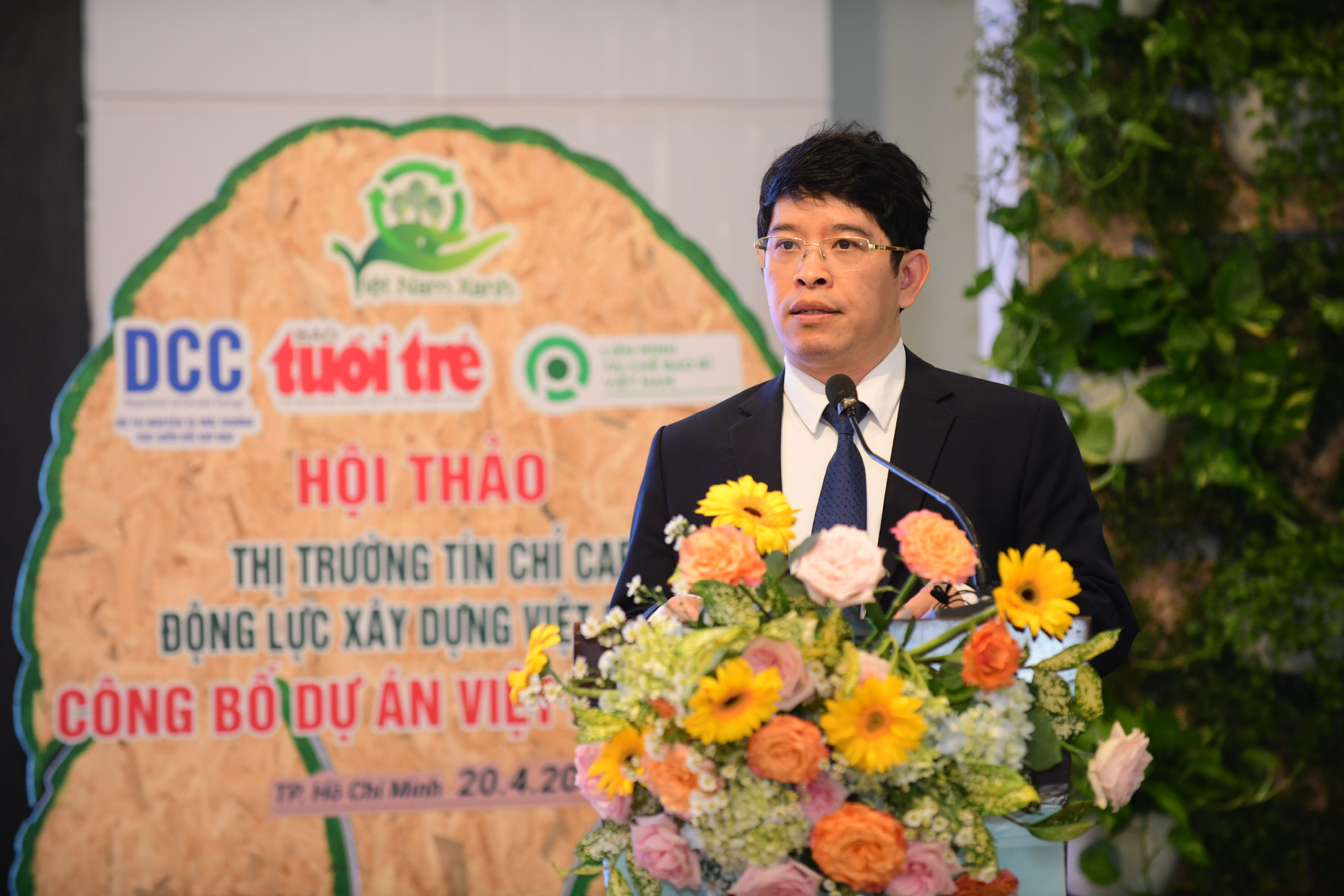 |
| Assoc Prof. Dr. Nguyen Dinh Tho, director of the Institute of Strategy and Policy on Natural Resources and Environment, speaks at the ‘Carbon Credit Market - A Driver for Building a Green Vietnam’ conference held in Ho Chi Minh City, April 20, 2024. Photo: Quang Dinh / Tuoi Tre |
Tran Quoc Tuan, director of the Department of Agriculture and Rural Development of Quang Binh Province, shared Quang Binh’s success in generating over VND80 billion ($3.1 million) through the sale of forest carbon credits.
Quang Binh boasts 650,000 hectares of forest and non-forest terrain.
Funding from Emission Reduction Purchase Agreements (ERPA) has bolstered forest protection and development efforts, resulting in job creation and income augmentation for residents, forest-dependent communities, and landowners throughout the province.
“The only way is to continue to protect and sustainably develop special-use forests, protection forests, and natural forests, promoting the planting of large timber forests, associated with the development of sustainable forest management plans and certification programs like Forest Stewardship Council (FSC),” Tuan emphasized.
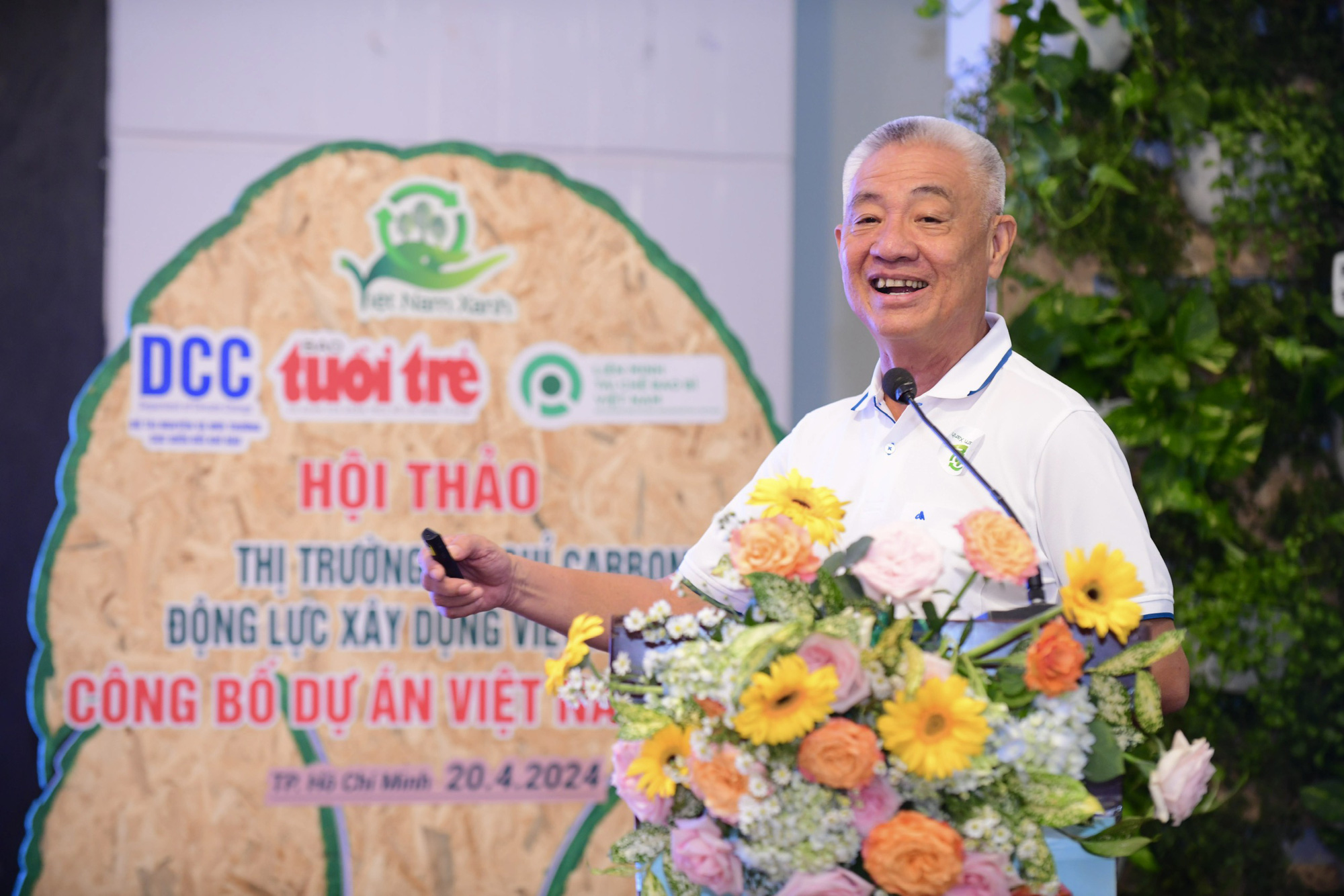 |
| Dr. Nguyen Thanh My, founder and chairman of RYNAN Technologies Vietnam JCS, speaks at the ‘Carbon Credit Market - A Driver for Building a Green Vietnam’ conference held in Ho Chi Minh City, April 20, 2024. Photo: Quang Dinh / Tuoi Tre |
Presenting on the implementation of carbon credit confirmation in Vietnam’s agricultural sector, Dr. Nguyen Thanh My, founder and chairman of RYNAN Technologies Vietnam JCS, highlighted new opportunities for farmers to earn income through sustainable practices, such as shrimp farming, with reduced greenhouse gas emissions.
“Only when farmers have income can they think about sustainability and the environment,” said Dr. My.
“New shrimp farming methods help shrimp reduce the risk of disease and use technology to measure carbon emissions, so that people can earn money from sustainable shrimp farming.”
Utilizing digital technology, artificial intelligence, and edge computing, My has developed shrimp farming methods that minimize greenhouse gas emissions, reduce energy and water usage, and enhance land efficiency.
He encourages private businesses to collaborate with the government to achieve net zero emissions, emphasizing the potential for innovative solutions to contribute to this national goal.
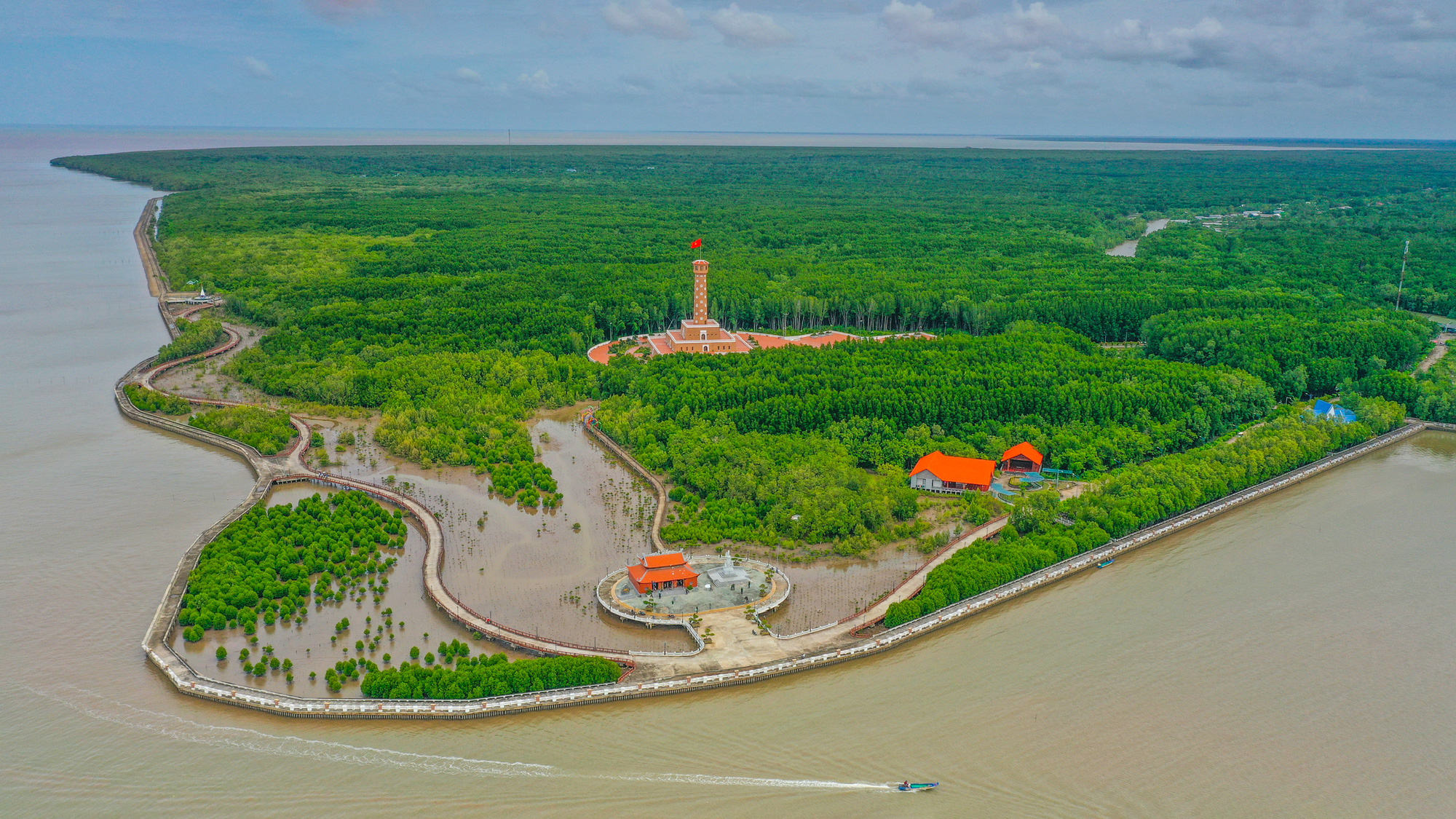 |
| A bird’s-eye photo shows Ca Mau Cape in Dat Mui Commune, Ngoc Hien District, Ca Mau Province, southern Vietnam. Photo: Quang Dinh / Tuoi Tre |
A carbon market development project underway
In his concluding remarks, Nguyen Tuan Quang, deputy director of the Department of Climate Change at the Ministry of Natural Resources and Environment, expressed appreciation for the insightful presentations, noting their valuable contribution to the ministry’s policy formulation and planning processes.
He emphasized that climate change is an irreversible trend, necessitating collaborative efforts across all economic sectors.
To achieve emissions reduction goals with international support, Vietnam has identified five main measures.
The first entails transitioning to renewable and clean energy sources, while the second focuses on enhancing energy efficiency and restructuring production methods.
The third involves increasing forest and ecosystem absorption rates, while the fourth centers on implementing carbon capture and landfill measures, albeit costlier.
Lastly, carbon pricing, encompassing carbon taxes and market development, plays a pivotal role, with 70 countries and territories currently employing carbon market mechanisms, controlling 23 percent of global emissions.
Quang elaborated on the carbon credit market, highlighting the necessity for credits to both reduce greenhouse gas emissions and ensure additionality, alongside adherence to specific standards.
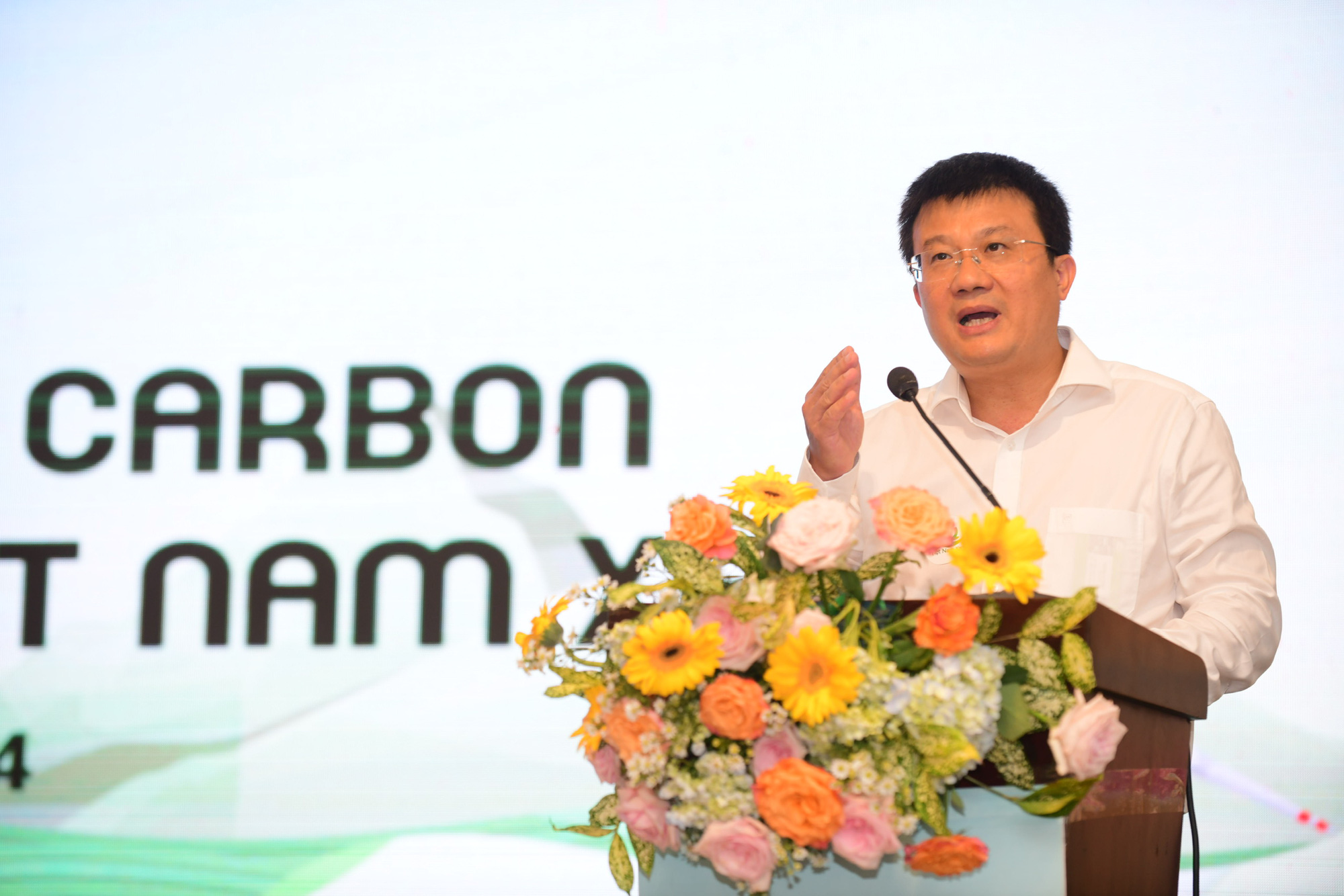 |
| Nguyen Tuan Quang, deputy director of the Department of Climate Change at the Ministry of Natural Resources and Environment, speaks at the ‘Carbon Credit Market - A Driver for Building a Green Vietnam’ conference held in Ho Chi Minh City, April 20, 2024. Photo: Quang Dinh / Tuoi Tre |
Quang emphasized that transactions within the carbon credit market, spanning various industries, sectors, and localities, must align with the country’s greenhouse gas emission goals.
For instance, in the case of forest credits in the north-central region, a mechanism should ensure that 95 percent of the transfer results are returned to Vietnam to support the nationally determined contributions (NDCs).
Vietnam’s carbon market is in the process of voluntary trading and adhering to international standards.
The Ministry of Finance is spearheading a project to develop the carbon market, alongside a new decree formulated by the Ministry of Natural Resources and Environment to regulate carbon credit standards, approval, and issuance, benefiting both businesses and the state.
“It’s crucial to ensure that state management agencies transmit complete and accurate information for effective implementation,” Quang emphasized.
“To achieve this, Tuoi Tre (Youth) newspaper, through conference, must serve as a bridge with other stakeholders.
“Today’s conference is part of the Green Vietnam program’s ongoing activities.
“The insights shared by businesses and experts are documented and disseminated to ensure a correct understanding of reducing greenhouse gas emissions and carbon credits.”
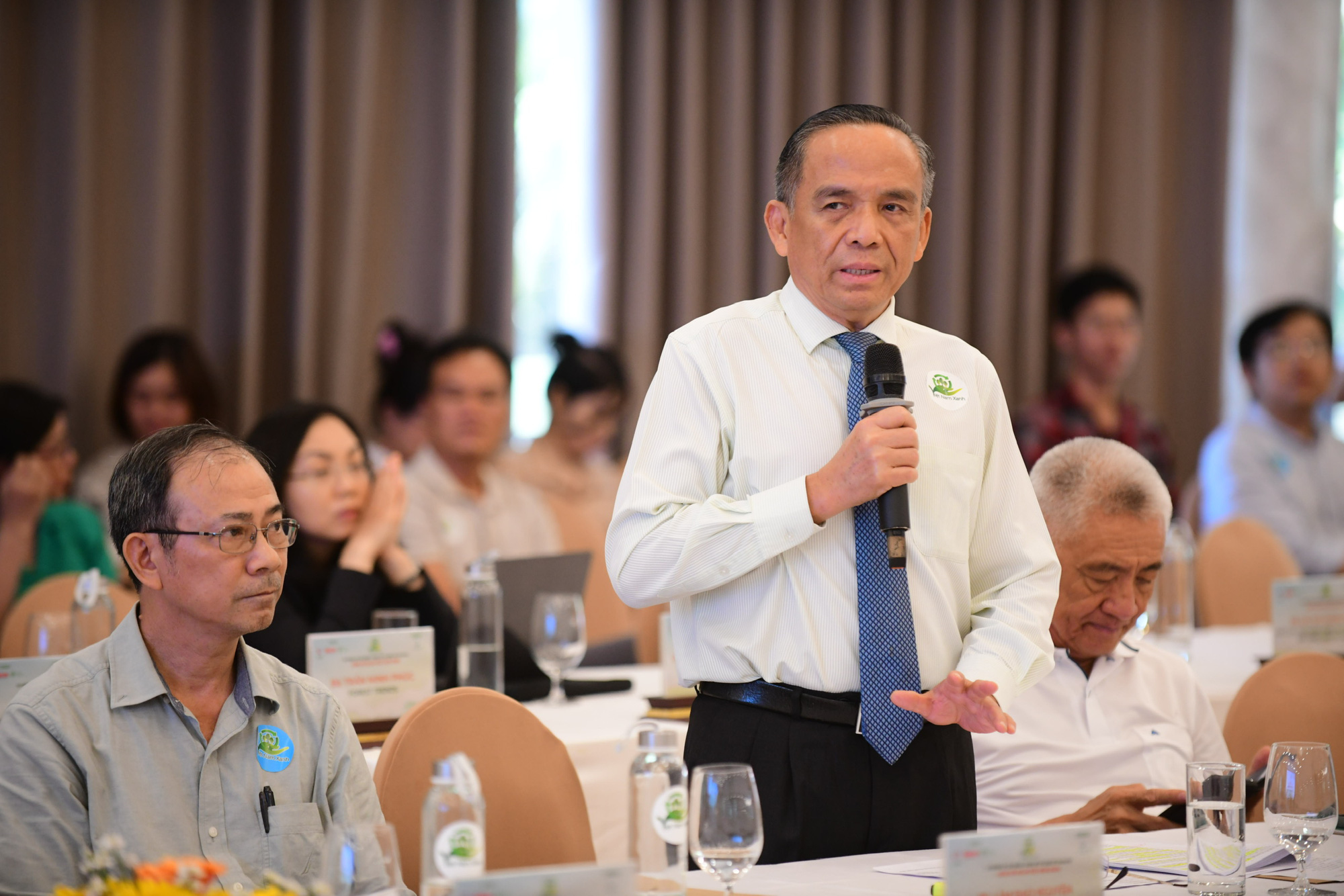 |
| Le Hoang Chau, chairman of the Ho Chi Minh City Real Estate Association, speaks at the ‘Carbon Credit Market - A Driver for Building a Green Vietnam’ conference held in Ho Chi Minh City, April 20, 2024. Photo: Quang Dinh / Tuoi Tre |
Le Hoang Chau, chairman of the Ho Chi Minh City Real Estate Association, highlighted the keen interest of real estate businesses in environmental protection, noting that many are developing green buildings that meet both domestic and international certifications.
Chau expressed gratitude to Tuoi Tre (Youth) newspaper for spearheading the Green Vietnam project and pledged the support of real estate businesses in advancing the net-zero roadmap.
 |
| Nguyen Trinh Thuy Trang, director of home affairs at Coteccons Construction JSC, speaks at the ‘Carbon Credit Market - A Driver for Building a Green Vietnam’ conference held in Ho Chi Minh City, April 20, 2024. Photo: Quang Dinh / Tuoi Tre |
Nguyen Trinh Thuy Trang, director of home affairs at Coteccons Construction JSC, shared the company’s commitment to environmental protection and emission reduction through various measures, including the adoption of renewable energy and the implementation of the 3R model.
Coteccons, along with its suppliers and subcontractors, imposes sanctions to ensure environmental compliance.
Trang explained that Coteccons conducts greenhouse gas emissions inventories at all projects to monitor emissions, followed by data analysis to devise effective reduction strategies.
“We remain steadfast in our commitment to emission reduction,” she affirmed.
 |
| Nguyen Hai Linh, chairman of Elisa Group, speaks at the ‘Carbon Credit Market - A Driver for Building a Green Vietnam’ conference held in Ho Chi Minh City, April 20, 2024. Photo: Quang Dinh / Tuoi Tre |
Tran Hoai Phuong, director of HDBank’s corporate customer department, disclosed the bank’s provision of capital for green projects and renewable energy ventures to support businesses.
Additionally, the bank actively engages in the carbon credit market, positioning itself as a partner to businesses, facilitating their participation in emissions reduction efforts.
 |
| A banner for the Green Vietnam project. |
Like us on Facebook or follow us on Twitter to get the latest news about Vietnam!



